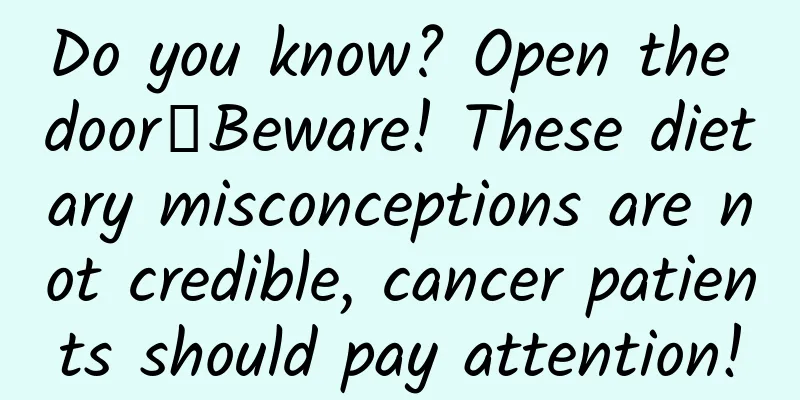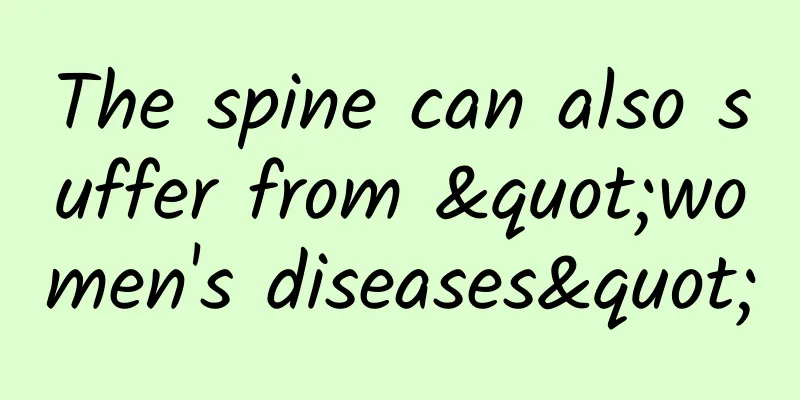Do you know? Open the door┋Beware! These dietary misconceptions are not credible, cancer patients should pay attention!

|
Liu Jiang, chief physician, national health science popularization expert, member of the National Health Commission's Capacity Building and Continuing Education Oncology Committee, director of the Oncology Department of the Xinjiang Autonomous Region People's Hospital, member of the Science Popularization Branch of the Chinese Medical Association, chairman of the Health Science Popularization Professional Committee of the Xinjiang Medical Association, and chief science communication expert of the autonomous region. As the saying goes, "food is the first necessity of the people", "have you eaten?" or "what did you eat?" are also common greetings among ordinary people. Cancer patients and their families often ask doctors what they should eat, what they should not eat, and how to eat when they visit doctors. It can be seen that the Chinese people are quite particular about eating. However, relevant research shows that there are still 40% to 80% of cancer patients in our country suffering from varying degrees of malnutrition and about 20% of cancer patients die directly from malnutrition! Although information is so advanced now, many patients and their families still have many misunderstandings about how and what to eat. Let's take a look at the common "misunderstandings" about the diet of cancer patients. Myth 1: Cancer patients should drink more soup to supplement nutrition Most people have learned from their parents since childhood that drinking soup is very nutritious, but this is not actually the case. Relevant data show that the nutrition in soup is only 5% to 10% of the nutrition in food raw materials. Soup mainly contains fat, vitamins and minerals. Most of the nutrition, especially protein, actually exists in the raw materials for cooking soup. Drinking a lot of soup will increase the feeling of fullness for cancer patients, thereby reducing the intake of other nutrients, leading to a monotonous diet, which will lead to malnutrition in the long run. Myth 2 : Superstitious belief in anti-cancer foods or health products During treatment, some cancer patients sometimes blindly follow other patients and believe in folk "prescriptions" and superstitious supplements such as cordyceps, ginseng, and ganoderma lucidum, believing that they can fight cancer. In fact, although some of these foods have a small auxiliary effect in the anti-cancer process, there is no definite evidence that these expensive supplements can cure tumors or prevent tumor recurrence. Therefore, cancer patients should follow the advice of their doctors on their diet. Myth 3 : Fasting can starve tumors to death Not eating will not inhibit tumor growth, nor will it "starve the tumor to death." Instead, it will cause harm to your health. Tumor cells are constantly robbing the body of normal cells of nutrients. If you fast, the first thing that will be affected is the body's immunity. A large amount of data shows that malnutrition is closely related to immunity, and malnourished individuals are actually more susceptible to bacterial or viral infections. Infections will further aggravate malnutrition, forming a vicious cycle, and ultimately leading to poor clinical prognosis. Myth 4 : Cancer patients cannot eat "irritating foods" Whenever someone is injured, we often hear people around us say that they cannot eat "irritating foods" for fear of a recurrence of the old disease. Therefore, many cancer patients will not eat so-called "irritating foods" for fear of tumor recurrence, but there is actually no evidence that "irritating foods" can cause tumor recurrence. From the perspective of oncology nutrition, "irritating foods" are mostly foods rich in high protein and various nutrients. These foods are not only a high-quality source of nutrients, but also have a positive effect on improving the body's immunity and promoting the recovery of cancer patients. Therefore, the dietary structure of cancer patients should be a diversified food on the basis of ensuring the intake of calories and protein, and there is no need to blindly "avoid certain foods". As COVID-19 prevention and control becomes normalized, what should cancer patients eat while at home? 1. Ensure that food is fresh and never eat spoiled food. 2. Ensure daily energy intake. The recommended daily intake is 2400-2700 kcal for men and 2100-2300 kcal for women. The energy of food ingredients can be checked online. 3. Ensure daily intake of high-quality protein such as eggs, milk, fish, shrimp, and soybeans. 4. The diet should be moderately salty and light, and cancer patients should avoid drinking too much greasy water. 5. Eat more foods rich in vitamins, minerals and dietary fiber. You can choose vegetables and fruits such as broccoli, purple cabbage, spinach, kiwi fruit, etc. Relevant data show that these vegetables have auxiliary anti-cancer effects. 6. If it is difficult to obtain green vegetables or fruits, you can also choose mushrooms, fungus, kelp and other fungi and algae that we store at home, which are also good alternative foods. 7. Ensure that the daily water intake reaches 1500-2000ml. The evaluation standard can be evaluated by the color of urine, and slightly yellow urine is appropriate. 8. For cancer patients with special circumstances, such as patients undergoing radiotherapy for gastrointestinal tumors, when normal dietary intake is insufficient, oral enteral nutrition can be used to supplement. 9. If a cancer patient is unable to eat or experiences a sharp weight loss while at home, the community should be contacted promptly to inform the patient that they need medical treatment, and the attending physician should be contacted promptly or the nearest doctor should be sought. Nutritional diet jingle for cancer patients 1 egg 1 cup of milk soy milk tofu appropriate amount The amount of meat dishes should be cooked in a healthy way Two handfuls of vegetables and one fist of fruit. Colorful is the key The staple food intake should be appropriate to four or five fists of common Be careful to control the amount of oil and salt, and use natural ingredients to enhance the flavor No matter how dangerous the virus is, nutritional immunity is safe |
<<: Are these 9.9 yuan free shipping headphones really usable? Will they damage your hearing?
Recommend
How long will the menstruation be delayed if I am in a bad mood?
Women are generally troubled by the issue of mens...
What causes hip pain in women?
The structure of the hip joint is relatively comp...
Can I have a breast massage while pregnant?
A woman's breasts undergo the greatest change...
Feeling that menstruation is not coming
The feeling that menstruation cannot be discharge...
When is the right time to go to the hospital for ovulation induction? On which day of the menstrual period should I go to the hospital for ovulation induction?
Ovulation induction is a medical method to help w...
The first menstrual period after abortion is very light
Menstruation will stop after pregnancy, but it wi...
What is the difference between raw Pu'er and cooked Pu'er? How to identify the quality of Pu'er tea
Pu'er tea is made with exquisite craftsmanshi...
Low menstrual flow and low estrogen levels
For women, menstruation is very important. Of cou...
A 31-year-old female singer is diagnosed with advanced thyroid cancer. Why does thyroid cancer prefer young women?
On July 25, "Feng Timo posted a message conf...
Shaofu Zhuyu Granules for Pelvic Inflammatory Disease
Pelvic inflammatory disease is a type of gynecolo...
Abdominal distension and pain after miscarriage, these problems actually occurred
Abortion is extremely harmful to female friends a...
When is the most likely time for a woman to get pregnant?
Pregnancy is a happy event for a family. Ovulatio...
What medicine is used for candidal vaginitis?
Since women experience menstruation every month, ...
What color is cockscomb? How to grow cockscomb in summer
According to observations and studies by Italian ...
Twitter: It is expected that Twitter will add 9 million users in Q2 2022
Recently, the head of Twitter's consumer prod...



![[Medical Q&A] Will I gain weight if I have psoriasis?](/upload/images/67f116d0b2337.webp)





